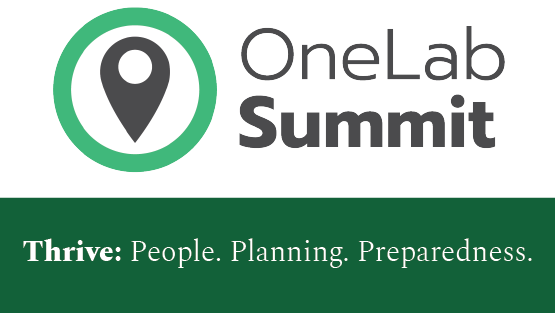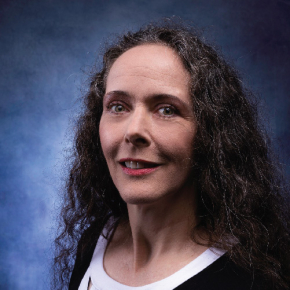Event Description
This video summarizes Day 1 of OneLab Summit 2024.
Event Media
OneLab Summit 2024 Day 1 Closing
Appreciate you joining us for OneLab Summit 2024. Today's presentations were focused
on people, which was really exciting. We heard from Dr. Dana Powell Baker, who talked about
the role and importance of diversity, equity, inclusion, accessibility, and belonging in public
health workforce development to advance health equity.
She shared many benefits of a diverse laboratory workforce, how a diverse laboratory
workforce can advance health equity, as well as laboratory professionals' roles in health equity,
as well as addressing health care disparities. She also talked about how diversity, equity,
inclusion, accessibility, and belonging are important to and can be addressed in laboratory
workforce recruitment and retention.
We heard from Dr. Chris Bean as well, who shared tips for personal effectiveness as a
leader with a focus on setting personal boundaries. She reminded us that in order to thrive, we
must set and maintain boundaries. She shared the SBI, or Situation, Behavior, and Impact,
model as a tool that we can use to set and maintain boundaries.
Another tip she shared was to automate our boundaries by using a system or a process
to help us reinforce our boundaries and be consistent. Hopefully, you completed the final
activity that she shared with you and that you have your sticky note by your computer screen
with what you have committed to do in order to set personal boundaries.
We also heard from Ms. Kathy Nucifora and Tammy Zinsmeister. They shared the COLA
Workforce Action Alliance's ideas on moving forward to address the needs of tomorrow's
laboratories. We learned about the 2023 Workforce Action Alliance Summit, which was
designed to inspire an alliance and community of practice to accelerate and replace — or
replicate existing initiatives and explore new initiatives to address the laboratory workforce
shortage.
Ms. Zinsmeister shared how important it is for us to communicate career pathways for
new and transitioning laboratory professionals, including raising high-school students'
awareness about the laboratory science. She also talked about the importance of inventorying
scholarships and resource programs for program directors and students. She also talked about
the importance of career pathways and employee retention.
And Ms. Nucifora shared insights into the importance of standardizing the way we refer
to the profession in order to better elevate public awareness about the profession.
And lastly, we heard from Dr. Nathan Johnson and Ms. Rebecca Bird. They shared some
innovative student recruitment ideas for MLS and MLT programs. Dr. Johnson reinforced that
there is a shortage of medical laboratory professionals. He gave us a quick history of medical
laboratory training in the US, including what led up to the current shortage.
He talked us through possible solutions, including reducing standards, replacing
technology, increasing in-house training, increasing the number of graduates. All of these things
could potentially lead to an increase in nonaccredited programs. It could also lead to on-the-job
training or other nontraditional education and certification pathways.
He believes that this could lead to the devaluation of accreditation and certification and
dilute professionalism and professional identity. Dr. Johnson also gave his ideas about what
professional organizations can do and are doing to help, what MLS and MLT programs can and
are doing to help fill the gap, what universities and colleges can and are doing to help fill those
gaps, as well as what hospitals can and are doing to help fill the gaps.
Dr. Johnson and Ms. Bird gave us examples of what laboratories can and are doing to
help fill the gaps. And Ms. Bird also talked us through what laboratory professionals can do and
what they are doing to help fill the gap.
If you haven't visited the OneLab Summit Virtual Exhibit Hall, please check it out. We
have placed a link to this in the chat. You're going to find virtual posters that highlight different
organizations, programs, and resources, as well as their success stories and more.
And if you missed any of today's presentations, or if you won't be able to make some of
the sessions tomorrow or the next day, please know that we will be making all of the OneLab
Summit presentation recordings available on the OneLab Summit web page at a later date. We
will definitely email everyone who registered for the Summit when the recordings are available.
We're also excited to announce that we built in a virtual networking session into
Thursday's activities. The networking session will start at 1:35 Eastern time on Thursday. And in
order to join the networking session on Thursday at 1:35, we are going to place another link to
a Zoom events opportunity for you to join. So that event will be not using the Zoom link that
you have used in order to connect to today's events and tomorrow's presentations and
Thursday's presentations. However, it will be a different link for the specific networking session.
And that networking session will not be recorded.
We look forward to seeing you tomorrow for Day 2 of the OneLab Summit 2024.
Tomorrow's sessions are focused on planning. And we'll learn how to maximize lessons learned
from past outbreaks to develop a sustainable laboratory cross-training program. We'll also
learn what a training needs assessment can tell us about your laboratory.
You'll learn how you can use the OneLab VR to train laboratory staff. You'll also learn
about the importance of understanding CLIA and CAP regulations to advance your laboratory
career. And we'll also hear about exciting enhancements to OneLab REACH, CDC's learning
management system, that is specific for clinical and public health laboratory professionals.
Tomorrow's OneLab Summit sessions start at 11 o'clock Eastern time. And you'll use the
same Zoom link you used today to access the sessions. We look forward to seeing you all
tomorrow. Thank you, and have a great evening.

Event Speakers

Blanche C. Collins, PhD, MCHES®
Centers for Disease Control and Prevention (CDC)
